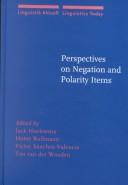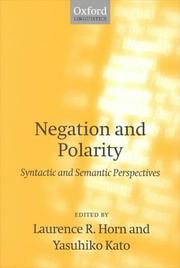| Listing 1 - 10 of 11 | << page >> |
Sort by
|
Book
ISBN: 9783110627510 9783110642537 9783110646290 Year: 2021 Publisher: Berlin De Gruyter Mouton
Abstract | Keywords | Export | Availability | Bookmark
 Loading...
Loading...Choose an application
- Reference Manager
- EndNote
- RefWorks (Direct export to RefWorks)
African languages. --- Polarity (Linguistics). --- Lexicology. Semantics --- African languages
Book
ISBN: 9789027255662 9789027274908 9027274908 9027255660 1283469316 9786613469311 9781283469319 6613469319 Year: 2012 Publisher: Amsterdam Benjamins
Abstract | Keywords | Export | Availability | Bookmark
 Loading...
Loading...Choose an application
- Reference Manager
- EndNote
- RefWorks (Direct export to RefWorks)
Although the field of polarity is well researched, this monograph offers a new take on polarity sensitivity that both challenges and incorporates previous theories. Based primarily on Swedish data, it presents new solutions to long-standing problems, such as the non-complementary distribution of NPIs and PPIs in yes/no-questions and conditionals, long distance licensing by superordinate elements, and the occurrence of polarity items in wh-questions. It is argued that polarity sensitivity can be understood in terms of evaluability.
Lexicology. Semantics --- Grammar --- Pragmatics --- Swedish language --- Polarity (Linguistics) --- Polarity item (Linguistics) --- Linguistic analysis (Linguistics) --- Grammar. --- Polarity (Linguistics).
Book

ISBN: 9783110303728 9783110305234 3110305232 3110303728 Year: 2013 Publisher: Berlin Boston
Abstract | Keywords | Export | Availability | Bookmark
 Loading...
Loading...Choose an application
- Reference Manager
- EndNote
- RefWorks (Direct export to RefWorks)
The grammar of negative polarity items is one of the challengesfor linguistic theory. NPIs cross-cut all traditional categories in grammar and semantics, yet their distribution is by no means arbitrary. Theories of NPI licensing have been proposed in terms of syntax, semantics, and pragmatics - each with its own merits and problems. The volume comprises state-of-the-art studies and suggests an interpolation approach to NPI licensing.
Polarity (Linguistics) --- Grammar, Comparative and general --- Context (Linguistics) --- Polarité (Linguistique) --- Négations (Linguistique) --- Contexte --- Negatives. --- Polarity item (Linguistics) --- Linguistic analysis (Linguistics) --- Negatives (Grammar) --- Situation (Linguistics) --- Linguistics --- Context --- Philology
Book
ISBN: 9780199567270 9780199567263 0199567271 Year: 2011 Publisher: Oxford : Oxford University Press,
Abstract | Keywords | Export | Availability | Bookmark
 Loading...
Loading...Choose an application
- Reference Manager
- EndNote
- RefWorks (Direct export to RefWorks)
Lexicology. Semantics --- Grammar --- Grammar, Comparative and general --- Polarity (Linguistics). --- Semantics. --- Negatives. --- Syntax. --- Polarity (Linguistics) --- Formal semantics --- Semasiology --- Semiology (Semantics) --- Comparative linguistics --- Information theory --- Language and languages --- Lexicology --- Meaning (Psychology) --- Polarity item (Linguistics) --- Linguistic analysis (Linguistics) --- Negatives (Grammar) --- Syntax --- Definiteness (Linguistics) --- Semantics --- Determinatives (Linguistics) --- Determiners (Linguistics) --- Classifiers (Linguistics) --- Indefiniteness (Linguistics) --- Linguistics --- Negatives --- Determiners --- Philology --- Grammar, Comparative and general Syntax

ISBN: 9027227616 1556197934 9786612163364 1282163361 9027299161 9789027299161 9781282163362 9781556197932 6612163364 Year: 2001 Volume: 40 Publisher: Amsterdam Benjamins
Abstract | Keywords | Export | Availability | Bookmark
 Loading...
Loading...Choose an application
- Reference Manager
- EndNote
- RefWorks (Direct export to RefWorks)
This study hypothesises that neg-raising is a cognitive phenomenon which arises while the human mind is processing the content of the sentence under the normal assumption of closed world. A 'neg-raised sentence' conveys an epistemic attitude towards the proposition expressed by the subordinate clause. The hedge consists in making it clear that a certain conclusion is compatible with the current information state, but cannot be proven.
Grammar --- Grammar, Comparative and general --- -Polarity (Linguistics) --- Polarity item (Linguistics) --- Comparative grammar --- Grammar, Philosophical --- Grammar, Universal --- Language and languages --- Philosophical grammar --- Negatives --- Grammar, Comparative --- Polarity (Linguistics) --- Grammaire comparée et générale --- Polarité (Linguistique) --- Congresses --- Congresses. --- Négations --- Congrès --- Linguistic analysis (Linguistics) --- Linguistics --- Philology
Book
ISBN: 9780199697977 0199697973 9780199697984 0199697981 0191643602 019176597X 9780191643606 9780191765971 Year: 2013 Volume: 2 Publisher: Oxford Oxford University Press
Abstract | Keywords | Export | Availability | Bookmark
 Loading...
Loading...Choose an application
- Reference Manager
- EndNote
- RefWorks (Direct export to RefWorks)
In a fundamental investigation of language and human reasoning Gennaro Chierchia looks at how syntactic and inferential processes interact through the study of polarity sensitive and free choice items. He reformulates the semantics of focus and scope and the pragmatics of implicature as part of the recursive semantic system.
Polarity (Linguistics) --- Polarity item (Linguistics) --- Linguistic analysis (Linguistics) --- Polarité (Linguistique) --- Polarity (Linguistics). --- Logic --- Philosophy of language --- Grammar --- Pragmatics --- Language and logic. --- Langage et logique --- Polarité (Linguistique) --- Grammar, Comparative and general --- Categories, Grammatical --- Grammatical categories --- Categorization (Linguistics) --- Componential analysis (Linguistics) --- Grammatical categories. --- Major form classes --- Linguistics --- Philology
Book
ISBN: 9027201668 9789027201669 9789027263384 9027263388 Year: 2018 Publisher: Amsterdam John Benjamins Publishing Company
Abstract | Keywords | Export | Availability | Bookmark
 Loading...
Loading...Choose an application
- Reference Manager
- EndNote
- RefWorks (Direct export to RefWorks)
The polarity of a sentence is crucial for its meaning. It is thus hardly surprising that languages have developed devices to highlight this meaning component and to contrast statements with negative and positive polarity in discourse. Research on this issue has started from languages like German and Dutch, where prosody and assertive particles are systematically associated with polarity contrast. Recently, the grammatical realization of polarity contrast has been at the center of investigations in a range of other languages as well. Core questions concern the formal repertoire and the exact meaning contribution of the relevant devices, the kind of contrast they evoke, and their relation to information structure and sentence mood. This volume brings together researchers from a theoretical, an empirical, and a typological orientation and enhances our understanding of polarity with the help of in-depth analyses and cross-linguistic comparisons dealing with the syntactic, semantic, pragmatic and/or prosodic aspects of the phenomenon.
Comparative linguistics --- Grammar --- Polarity (Linguistics) --- Grammar, Comparative and general --- Polarity item (Linguistics) --- Linguistic analysis (Linguistics) --- Comparative grammar --- Grammar, Philosophical --- Grammar, Universal --- Language and languages --- Philosophical grammar --- Linguistics --- Philology --- Grammar, Comparative --- Grammar, Comparative and general. --- E-books

ISBN: 0198238738 0198238746 9780198238737 Year: 2000 Publisher: Oxford: Oxford university press,
Abstract | Keywords | Export | Availability | Bookmark
 Loading...
Loading...Choose an application
- Reference Manager
- EndNote
- RefWorks (Direct export to RefWorks)
Lexicology. Semantics --- Grammar --- Grammar, Comparative and general --- Polarity (Linguistics) --- Semantics. --- Négations (Linguistique) --- Polarité (Linguistique) --- Syntaxe --- Sémantique --- Negatives. --- Syntax. --- 801.56 --- Syntaxis. Semantiek --- 801.56 Syntaxis. Semantiek --- Polarity (Linguistics). --- Négations (Linguistique) --- Polarité (Linguistique) --- Sémantique --- Semantics --- Formal semantics --- Semasiology --- Semiology (Semantics) --- Comparative linguistics --- Information theory --- Language and languages --- Lexicology --- Meaning (Psychology) --- Polarity item (Linguistics) --- Linguistic analysis (Linguistics) --- Syntax --- Negatives (Grammar) --- Negatives --- Linguistics --- Philology --- Grammar, Comparative and general - Negatives. --- Grammar, Comparative and general - Syntax. --- Grammar, Comparative and general Syntax
Book
ISBN: 3319174630 3319174649 Year: 2016 Publisher: Cham : Springer International Publishing : Imprint: Springer,
Abstract | Keywords | Export | Availability | Bookmark
 Loading...
Loading...Choose an application
- Reference Manager
- EndNote
- RefWorks (Direct export to RefWorks)
This volume offers insights on experimental and empirical research in theoretical linguistic issues of negation and polarity, focusing on how negation is marked and how negative polarity is emphatic and how it interacts with double negation. Metalinguistic negation and neg-raising are also explored in the volume. Leading specialists in the field present novel ideas by employing various experimental methods in felicity judgments, eye tracking, self-paced readings, prosody and ERP. Particular attention is given to extensive crosslinguistc data from French, Catalan and Korean along with analyses using semantic and pragmatic methods, corpus linguistics, diachronic perspectives, and longitudinal acquisitional studies as well as signed and gestural negation. Each contribution is situated with regards to major previous studies, thereby offering readers insights on the current state of the art in research on negation and negative polarity, highlighting how theory and data together contributes to the understanding of cognition and mind. .
Grammar, Comparative and general -- Negatives. --- Polarity (Linguistics). --- Languages & Literatures --- Social Sciences --- Psychology --- Philology & Linguistics --- Grammar, Comparative and general --- Polarity (Linguistics) --- Negatives. --- Polarity item (Linguistics) --- Negatives (Grammar) --- Linguistic analysis (Linguistics) --- Psycholinguistics. --- Linguistics --- Semantics. --- Philosophy of Language. --- Language, Psychology of --- Language and languages --- Psychology of language --- Speech --- Thought and thinking --- Formal semantics --- Semasiology --- Semiology (Semantics) --- Comparative linguistics --- Information theory --- Lexicology --- Meaning (Psychology) --- Philosophy. --- Psychological aspects --- Language and languages—Philosophy.
Book
ISBN: 9783110238600 3110238608 130696847X 3110238616 9783110238617 Year: 2011 Volume: 235 Publisher: Berlin: de Gruyter,
Abstract | Keywords | Export | Availability | Bookmark
 Loading...
Loading...Choose an application
- Reference Manager
- EndNote
- RefWorks (Direct export to RefWorks)
Why do grammars change? The cycle of negation proposed by Jespersen is crucially linked to the status of items and phrases. The definition of criteria establishing when a polarity item becomes a negative element, and the identification of the role of phrases for the evolution of negation are the two objectives pursued by the contributions to this volume. The contributions look at the emergence of negative items, and their relation within a given sentence, with particular reference to English and French. The comparative perspective supports the documentation of the fine-grained steps that shed light on the factors that (i) determine change and those that (ii) accompany actuation, which are considered through a dialogue between functionalist and formalist approaches. By looking at the place of negation in the architecture of the sentence, they take up the debate as to the relevance of phrasal projections and consider the role of features. Focusing on the make-up of individual items makes it possible to re-conceptualise the Jespersen cycle as the apparent result of the documented evolution patterns of individual (series of) items. This novel perspective is solidly grounded on an extensive use of the complete, up to date bibliography, and will contribute to shape future research.
Grammar, Comparative and general --- Polarity (Linguistics) --- Semantics --- Negatives --- Syntax --- Semantics. --- Negatives. --- Syntax. --- Lexicology. Semantics --- Grammar --- 801.56 --- 801.56 Syntaxis. Semantiek --- Syntaxis. Semantiek --- Négations (Linguistique) --- Polarité (Linguistique) --- Syntaxe --- Sémantique --- Polarity item (Linguistics) --- Negatives (Grammar) --- Formal semantics --- Semasiology --- Semiology (Semantics) --- Comparative linguistics --- Information theory --- Language and languages --- Lexicology --- Meaning (Psychology) --- Linguistic analysis (Linguistics) --- Negation. --- Polarity (Linguistics). --- Sprachwandel. --- Négation (linguistique) --- Grammaire comparée --- Sémantique structurale --- Syntaxe. --- Sémantique. --- Linguistics --- Philology --- Grammar, Comparative and general - Negatives --- Grammar, Comparative and general - Syntax --- Grammar, Comparative and general Syntax --- Historical Linguistics. --- Jespersen Cycle. --- Language Change.
| Listing 1 - 10 of 11 | << page >> |
Sort by
|

 Search
Search Feedback
Feedback About UniCat
About UniCat  Help
Help News
News